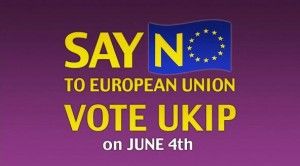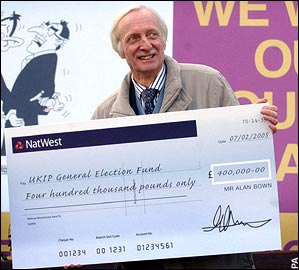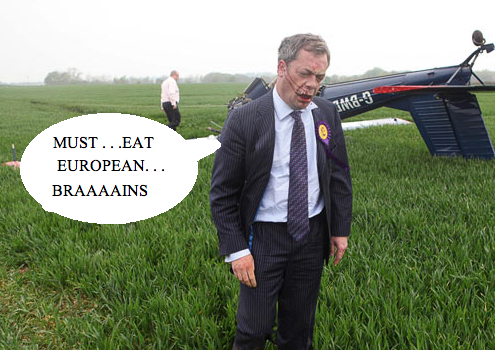 UKIP are the most successful minor party in British electoral history. Despite having no MP’s, no official backing from any major newspaper, and only 70 councillors UKIP were able to beat the Lib Dems and come third in 2004’s European Elections. Last year they went further, coming second and beating the governing Labour Party. Today UKIP send as many MEP’s to Brussels as Labour do. This is a formiddable achievement for a party that was only founded in 1993.
UKIP are the most successful minor party in British electoral history. Despite having no MP’s, no official backing from any major newspaper, and only 70 councillors UKIP were able to beat the Lib Dems and come third in 2004’s European Elections. Last year they went further, coming second and beating the governing Labour Party. Today UKIP send as many MEP’s to Brussels as Labour do. This is a formiddable achievement for a party that was only founded in 1993.
Despite this fantastic growth, there has been very little discussion or criticism of UKIP on the Left. This is despite UKIP representing a “radical” right-wing constituency, with MEP’s further to the right than most Tory MP’s and who would attack the standard of living of working people quite dramatically if elected.
Most concern on the Left to radical right wing parties has been directed to the growth of the BNP, who picked up 2 MEP’s at the last European Election. UKIP is very obviously and clearly not the same kind of party as the BNP but there is definitely competition between both parties for the same anti-EU, anti-Immigration, nationalist vote. This vote isn’t homogeneous however and there are important differences. UKIP attract a wealthier, home counties right-wing vote, compared to the BNP who attract support from much poorer areas in English cities.
UKIP and the BNP also have differences in how they view society should be organised; UKIP are made up of Thatcherites who are too Eurosceptic for the Tory Party but still uphold the free market and libertarian values. The BNP in contrast support protectionism for British companies – this has led to some on the Tory nutter right to attack the BNP as “Left-wing”. Farage, UKIP’s former leader and best known public figure says the difference between them and the BNP is that they are the “do what you like party” and the BNP are the “hang em and flog em party”.

Parliament for the jocks you say? What ho, no, let them use the one behind me!
Of course the biggest and most fundamental difference between the two parties is that the BNP is still a neo-Nazi organisation pretending to be a populist right wing one, while UKIP is just a populist right-wing party. UKIP doesn’t believe in the racial supremacy fantasies of the BNP and has no problems with ethnic minorities as candidates or members. It’s for this reason that it would be unimaginable (and wrong) for UKIP to be no platformed the way the BNP is.
Despite these important differences however, UKIP deserves a lot more attention and criticism from the Left than it has got. It’s generally been ignored by the Left as it is not in any position to control the Government or Local councils and because its not a fascist organisation like the BNP. However UKIP may not always be the eccentric party of ex-Tory Daily Mail readers, able to attract a bit of a laugh now and again with some Bernard Manning style comments about women or attacking the EU President as a damp rag.
UKIP’s potential danger can be seen in the man they invited last week to the House of Lords – Geert Wilders. UKIP’s leader, Lord Pearson invited Wilders to broadcast his anti-Muslim film “Fitna”. Wilders was also welcomed to London by the English Defence Leage, producing an unholy trinity of football casuals, ex-Tory lords and Wilders. This display was another example of the EDL are acting as violent thugs for ideas which are circulated and promoted by well heeled members of the establishment who are far more “respectable” than they are.

I likesh a shmoke and a pancake, but I don't likesh the Mushlimsh
UKIP have tried to justify their love in with Wilders on the basis that we need to have a discussion about “radical Islam”. Time and time again however Wilders has made clear that his problem is with Islam, and sees no difference between moderate and radical Muslims. Wilders today is the most successful far-Right politician in Europe, and has a real chance of becoming the next Prime Minister of the Netherlands.
Wilders has made it a demand for any coalition Government in which his Party for Freedom (PVV) takes part, that the hijab is banned from all public institutions; meaning any Muslim who wears the hijab will be banned from working in or using a library, swimming pool, school etc. Wilders does not even attempt to cover his attack on Muslims by saying its about secularism – he openly says Jewish skull caps and crucifixes will not be affected by this law, as they are a part of western culture.
People should remember that the hijab is not the burqa. Unlike the burqa, which is an extreme form of Islamic dress worn by a very small number of Muslims in Europe the Hijab is a far more modest headscarf little different from a nuns habit. The hijab is worn by a massive proportion of Muslim women – banning them from wearing it is a clear attack on their civil rights. There is no practical difference between someone who wears a hijab, a turban or skullcap in how they do their job or use public services. They have been singled out because they are Muslims.
Wilders has also called for the banning of the Koran, and for Guantanamo bay style facilities for Muslims in the Netherlands. He is also a staunch defender of Israel – Wilders PVV is in fact interested with fighting a war against the freedoms of the Netherlands’s Muslim minority.
How far UKIP will go down the PVV road remains to be seen, but it is clear that they are attempting to win support not just from attacking the EU but now from attacking Muslims. UKIP have become the first party in the UK to call for the banning of the Burka in all public places. This is further than even the BNP wants to go – they only want the burka banned in govt buildings. Whatever criticism can be made of the burka for it’s attacks on women’s rights it’s clear that if UKIP are cosying up with Wilders it is unlikely they are banning it to emancipate Muslim women.
UKIP also need to be dug up by the Left for their hypocrisy on the issues of democracy and accountability they claim to uphold. UKIP have won virtually all their support on their largely correct attacks on the European President and European Commission for being totally unaccountable and unelected – but they see no contradiction between these institutions and having an unelected Lord as leader! There is no attack on the House of Lords from UKIP on what it is, an undemocratic chamber which has the power to stop laws being made by a parliament with elected MP’s.
UKIP’s policy on Scotland also betrays their Tory roots – they call for the abolition of the Scottish Parliament, an act that would return Scotland to the bad old days of the 80’s where our votes were irrelevant, and the votes of middle England would decide who rules Scotland.
After all as bad as the EU parliament is, its done nothing like force the poll tax on Scotland using MP’s elected in England – but then again, that wouldn’t bother UKIP much seeing as they argue for a “flat tax”. A flat tax means that everyone pays the same amount of tax for their services regardless of their income, which was of course the exact same principle the poll tax used. They also call for a reduction in the rate of corporation tax, referring to Thatcher and Reagan’s UK and USA as a justification. This flat tax would also mean less funding for public services, cutting jobs and services in order to transfer even more wealth to the rich. This “freedom” for companies to do whatever they want is part of UKIP’s attack on the alleged “social democratic consensus” at Westminster.
Both this flat tax and reduction in corporation tax would be another salvo in a war which has been going on for 30 years, a war between the richest 1% of the population who have seen their wealth skyrocket whilst the working majority have seen their wealth stagnate or barely increase. Alongside their cosying up to someone who is determined to deny public services and jobs to Muslims in the Netherlands, it shows up UKIP as being a bit more dangerous than their charismatic and dotty English Toff MEP’s suggest.
Right now UKIP are unlikely to put into practice any of these policies. Both parties of the radical right in the UK, the BNP and UKIP have major barriers to growth. In the case of the BNP it’s their racism and neo-Nazi baggage. For UKIP its being identified as solely interested in Europe.
The PVV in the Netherlands shows that these barriers can be overcome however. If UKIP and the BNP dealt with these barriers by dumping Griffin and other neo-Nazis, paid more attention to domestic affairs and founded a new radical right party along the lines of the PVV there is little to stop them from emulating Wilders success. There is clearly a very large vote for opposing the EU, immigration, political correctness and for old school Tory values that Cameron has had to cede somewhat to take the centre ground.
Such a party of the radical right would pose a threat to Scotland’s democratic rights, working peoples status in the tax system, funding to public services and civil rights of Muslims in the UK. Remember that the next time you see Nigel Farage guffaw on Question Time and ask if anyone wants to go for a punt and a Pimms.










 Yay! Election! Which shade of shite will you choose?
Yay! Election! Which shade of shite will you choose? - Not UKIP, whose former leader Nigel Farrage was
- Not UKIP, whose former leader Nigel Farrage was 



 Entries (RSS)
Entries (RSS)